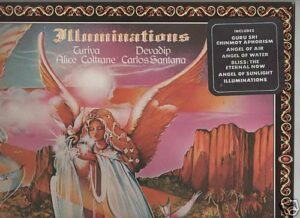Descrizione
PREMESSA: LA SUPERIORITA’ DELLA MUSICA SU VINILE E’ ANCOR OGGI SANCITA, NOTORIA ED EVIDENTE. NON TANTO DA UN PUNTO DI VISTA DI RESA, QUALITA’ E PULIZIA DEL SUONO, TANTOMENO DA QUELLO DEL RIMPIANTO RETROSPETTIVO E NOSTALGICO , MA SOPRATTUTTO DA QUELLO PIU’ PALPABILE ED INOPPUGNABILE DELL’ ESSENZA, DELL’ ANIMA E DELLA SUBLIMAZIONE CREATIVA. IL DISCO IN VINILE HA PULSAZIONE ARTISTICA, PASSIONE ARMONICA E SPLENDORE GRAFICO , E’ PIACEVOLE DA OSSERVARE E DA TENERE IN MANO, RISPLENDE, PROFUMA E VIBRA DI VITA, DI EMOZIONE E DI SENSIBILITA’. E’ TUTTO QUELLO CHE NON E’ E NON POTRA’ MAI ESSERE IL CD, CHE AL CONTRARIO E’ SOLO UN OGGETTO MERAMENTE COMMERCIALE, POVERO, ARIDO, CINICO, STERILE ED ORWELLIANO, UNA DEGENERAZIONE INDUSTRIALE SCHIZOFRENICA E NECROFILA, LA DESOLANTE SOLUZIONE FINALE DELL’ AVIDITA’ DEL MERCATO E DELL’ ARROGANZA DEI DISCOGRAFICI .
McCOY TYNER
enlightenment
Disco Doppio 2 LP 33 giri , Milestone / Fantasy Records, M-55001 , 1973 , USA
ECCELLENTI CONDIZIONI, both vinyls ex++/NM , cover ex++/NM
Alfred Mc Coy Tyner (Filadelfia, 11
dicembre 1938)
è un pianista
statunitense di musica jazz.Nasce a Filadelfia l’11 dicembre 1938.
Comicia lo studio del pianoforte all’età di 13 anni sotto le influenze
della madre. Le sue prime influenze musicali vengono dall’ascolto di Bud
Powell.
La carriera di Tyner comincia nel 1960, come pianista della
formazione di Benny Golson e Art
Farmer. Nello stesso anno sostituisce Steve Kuhn e si
inserisce ufficialmente nello storico quartetto di John
Coltrane insieme a Elvin
Jones alla batteria e Jimmy Garrison al contrabbasso. Partecipa quindi, tra 1961
e 1965, alla composizione di alcuni tra i più importanti dischi della
storia jazzistica come My Favorite Things, A Love Supreme, Ballads ecc.
Tuttavia i rapporti con Coltrane diventano ben presto difficili. La
svolta in verso il free jazz e l’atonalità di Coltrane non piacciono a
Tyner che affronta un violento diverbio con Elvin
Jones. Sentendosi di fatto escluso dal quartetto, Tyner avvia la
carriera solista e fonda un trio del quale diventa il leader.
Dopo Coltrane
Lasciato quindi lo storico quartetto, pubblica, con la Blue Note Records, tra 1967 e 1970, una serie di album di
stampo hard
bop. The Real McCoy (1967), Tender Moments (1967), Time for Tyner
(1967), Expansions
(1968) ed Extensions
(1970) sono i maggiori esempi del periodo
Nel 1973, con la pubblicazione dell’album Enlightenment (Milestone
Records), contenente la registrazione dell’esibizione tenuta al Festival
Jazz di Montreux alla testa del suo nuovo quartetto – vincitore anche
del disco dell’anno – una nuova e grossa attenzione, da parte del
pubblico e della critica si concentrò verso Tyner, affrancandolo
definitivamente dall’appellativo di “pianista di Coltrane” e
permettendogli di sbancare, nelle varie categorie e per diversi anni, i
referendum delle principali riviste specializzate
Enlightenment is a live
album by jazz
pianist McCoy
Tyner released on the Milestone label. It was recorded at the Montreaux Jazz
Festival in Switzerland on July 7, 1973 and features Tyner
in performance with Azar Lawrence, Joony Booth
and Alphonse Mouzon. The Allmusic
review by Scott Yanow states “This is one of the great
McCoy Tyner recordings. The powerful, percussive, and highly influential
pianist sounds quite inspired throughout his appearance at the 1973
Montreux Jazz Festival”.
Etichetta: Milestone
Catalogo: M – 55001
Matrici : M-55001-A / M-55001-D /M-55001-B /M-55001-C
- Supporto:vinile 33 giri
- Tipo audio: stereo
- Dimensioni: 30 cm.
- Facciate: 4
- Gatefold / copertina apribile, white paper inner sleeves
Track listing
Side one
- “Presenting the McCoy Tyner Quartet” – 1:18
- “Enlightenment Suite, Part 1 – Genesis” – 10:04
- “Enlightenment Suite, Part 2: The Offering” – 4:18
Side two
- “Enlightenment Suite, Part 3 – Inner Glimpse” – 10:36
- “Presence” – 10:31
Side three
- “Nebula” – 8:36
- “Walk Spirit, Talk Spirit – introduction” – 6:35
Side four
- “Walk Spirit, Talk Spirit” – 18:42
- All compositions by McCoy Tyner
- Recorded at the Montreux Jazz Festival, Casino De Montreux,
Switzerland, July 7, 1973 - Remixed at Fantasy Studios, Berkeley, CA.
- Recorded at the Montreux Jazz Festival, Casino De Montreux,
Personnel
- McCoy Tyner: piano, percussion
- Azar Lawrence: tenor saxophone, soprano saxophone
- Joony Booth: bass
- Alphonse Mouzon: drums
This is one of the great McCoy Tyner recordings. The powerful,
percussive, and highly influential pianist sounds quite inspired
throughout his appearance at the 1973 Montreux Jazz Festival. Azar
Lawrence (on tenor and soprano) is also quite noteworthy and there
is plenty of interplay with bassist Juney
Booth and drummer Alphonse
Mouzon. But Tyner is the main star, whether it be on his three-part
“Enlightenment Suite,” “Presence,” “Nebula,” or the 25-minute “Walk
Spirit, Talk Spirit.”
Mac Coy Tyner è divenuto famoso per essere stato il pianista di John
Coltrane, ma ha anche saputo ritagliarsi una splendida carriera
post-coltraniana divenendo uno dei pianisti più influenti del Jazz
contemporaneo. Affascinato nei primordi dal pianismo di Bud Powell,
Richie Powell e Thelonious Monk, si è creato col passare del tempo uno
stile personale capace di dialogare col gruppo o, da solista, suonare
come se fosse in gruppo, riempendo gli spazi con note ampie e
sostanziose, melodiose e potenti. A inizi carriera, nel 1959, entra nel
Jazztet di Art Farmer / Benny Golson, ma dopo sei mesi lo abbandona per
unirsi a Coltrane e divenire parte del celebre ed indimenticabile
quartetto. Vi resta per cinque anni e incide anche dischi a suo nome per
la label Impulse!. Lasciato Coltrane firma per la Blue Note e registra
con Joe Henderson e Elvin Jones un grande disco intitolato The Real
McCoy. Nel 1972 arriva la definitiva consacrazione: firma per
l’etichetta Milestone e registra Sahara che sarà votato dai critici
della rivista Down Beat disco dell’anno. Arriso dal successo gira il
mondo in tournèe con il suo gruppo fino al 1978 quando lo abbandona per
unirsi ad una band stellare con Sonny Rollins. Gli anni Ottanta e
Novanta sono ricchi di soddisfazioni: firma nuovamente con la Blue Note,
lavora con il gruppo di All Stars, suona con il suo trio ed incide
dischi. Il nuovo millennio lo vede ancora sulla scena in forma di
leggenda vivente.
SHAPING MODERN JAZZ…
Tyner’s blues-based piano style, replete with sophisticated chords and
an explosively percussive left hand has transcended conventional styles
to become one of the most identifiable sounds in improvised music. His
harmonic contributions and dramatic rhythmic devices form the vocabulary
of a majority of jazz pianists.
Born in 1938 in Philadelphia, he became a part of the fertile jazz and
R&B scene of the early ’50s. His parents imbued him with a love for
music from an early age. His mother encouraged him to explore his
musical interests through formal training.
At 17 he began a career-changing relationship with Miles Davis’ sideman
saxophonist John Coltrane. Tyner joined Coltrane for the classic album
My Favorite Things (1960), and remained at the core of what became one
of the most seminal groups in jazz history, The John Coltrane Quartet.
The band, which also included drummer Elvin Jones and bassist Jimmy
Garrison, had an extraordinary chemistry, fostered in part by Tyner’s
almost familial relationship with Coltrane.
From 1960 through 1965, Tyner’s name was propelled to international
renown, as he developed a new vocabulary that transcended the piano
styles of the time, providing a unique harmonic underpinning and
rhythmic charge essential to the group’s sound. He performed on
Coltrane’s classic recordings such as Live at the Village Vanguard,
Impressions and Coltrane’s signature suite, A Love Supreme.
In 1965, after over five years with Coltrane’s quartet, Tyner left the
group to explore his destiny as a composer and bandleader. Among his
major projects is a 1967 album entitled The Real McCoy, on which he was
joined by saxophonist Joe Henderson, bassist Ron Carter and fellow
Coltrane alumnus Elvin Jones. His 1972 Grammy-award nomination album
Sahara, broke new ground by the sounds and rhythms of Africa. Since
1980, he has also arranged his lavishly textured harmonies for a big
band that performs and records when possible. In the late 1980s, he
mainly focused on his piano trio featuring Avery Sharpe on bass and
Aarron Scott on drums. Today, this trio is still in great demand. He
returned to Impulse in 1995, with a superb album featuring Michael
Brecker. In 1996 he recorded a special album with the music of Burt
Bacharach. In 1998 he changed labels again and recorded an interesting
latin album and an album featuring Stanley Clarke for TelArc.
In the summer of 2005, Tyner joined forces with the Blue Note Jazz Club
in New York and became the first client of Blue Note Management. That
summer, Tyner began work on some unique projects, including performances
with tap-dancer Savion Glover and the development of the Impulse!
Septet, featuring his trio with some of today’s top hornmen.
Tyner’s partnership with the Blue Note has led to the formation of his
own record label, aptly titled McCoy Tyner Music. The label is a
subsidiary of the Blue Note’s In-House record label, Half Note Records.
The label launched on September 11, 2007, upon the release of Tyner’s
latest CD, “Quartet” featuring Joe Lovano, Christian McBride, and Jeff
“Tain” Watts. Recorded live on New Year’s Eve 2006, the album features a
working band at its finest with some of today’s “legends in training.”
Additionally, the record shows that Tyner, who now carries the torch as
the only surviving member of the John Coltrane Quartet, is still at the
top of his game as a composer, performer, and bandleader.
In review of Tyner’s latest album “Quartet,” Thomas Conrad of JazzTimes
wrote “‘Quartet’ succeeds not only because everyone plays so well, but
also because they play so well together. The pairing of Tyner and Lovano
is synergistic. The McBride/Watts rhythm section, for intelligent
propulsion, is state-of-the-art. ‘Quartet’ succeeds once more because of
its excellent sonic quality. It was recorded by engineer Phil Edwards
at Yoshi’s in Oakland, Calif., over New Year’s Eve weekend 2006. Almost
always, even the best-sounding jazz albums require you to make a choice.
You can have the visceral in-the-moment reality of a live recording, or
the full bandwidth resolution of a studio session. This one has both.”
McCoy Tyner’s second release for the McCoy Tyner Music label is
scheduled for a summer 2008 release. The recording features the stellar
rhythm section of Tyner, Ron Carter, and Jack DeJohnette with four
modern guitarists (and one banjo) of our time: Bill Frisell, Marc Ribot,
John Scofield, Derek Trucks, and Bela Fleck. The package will be a
CD/DVD featuring state-of-the-art technology that allows the viewer to
manually choose which musician(s) they would like to view in the studio
at any time during each track. In 2009, Tyner will release his third
recording for McCoy Tyner Music, a solo piano performance recorded live
in San Francisco during the summer of 2007.
Tyner has always expanded his vision of the musical landscape and
incorporated new elements, whether from distant continents or diverse
musical influences. More recently he has arranged for big bands,
employed string arrangements, and even reinterpreted popular music.
Today, Tyner has released nearly 80 albums under his name, earned four
Grammys and was awarded Jazz Master from the National Endowment for the
Arts in 2002. He continues to leave his mark on generations of
improvisers, and yet remains a disarmingly modest and spiritually
directed man.



